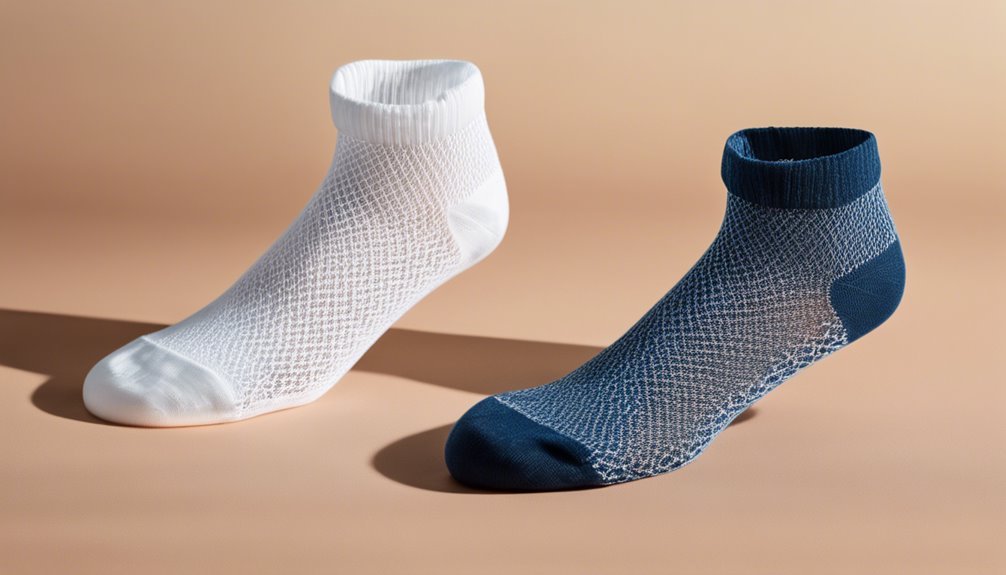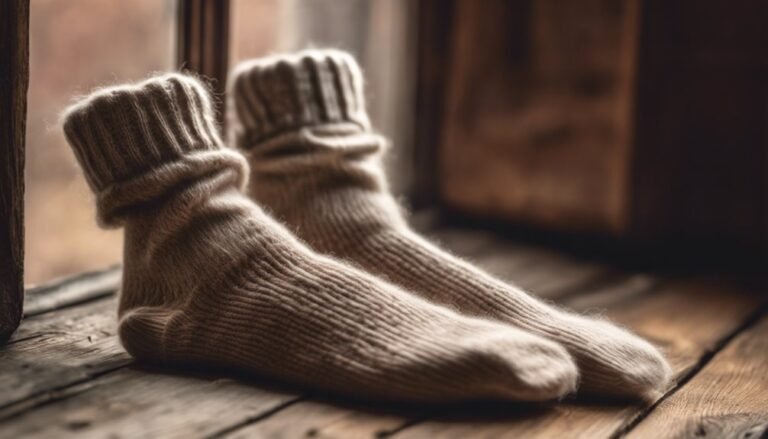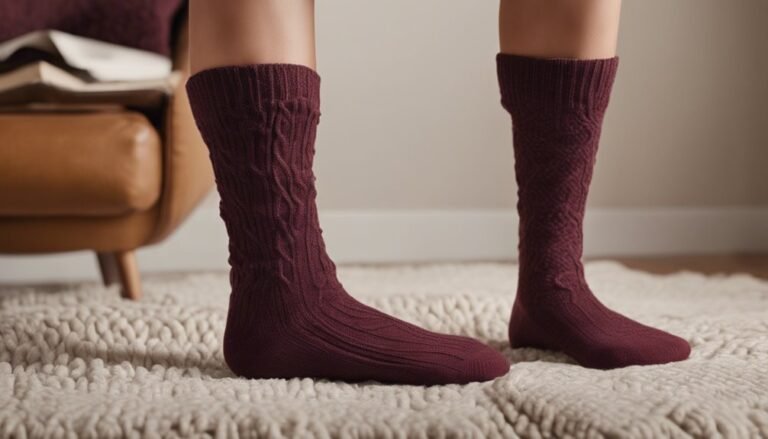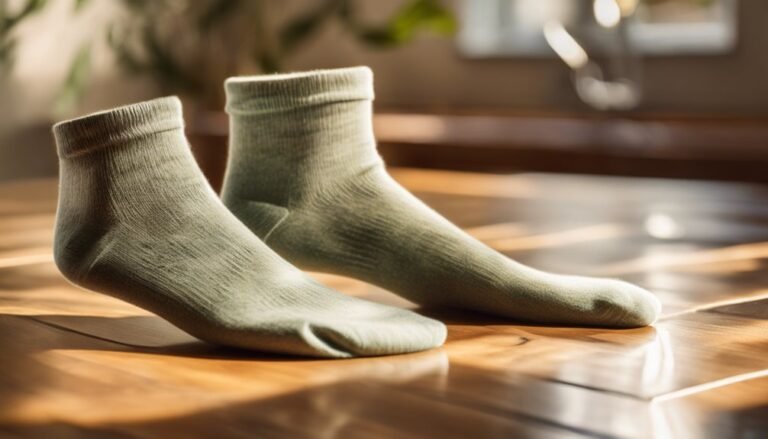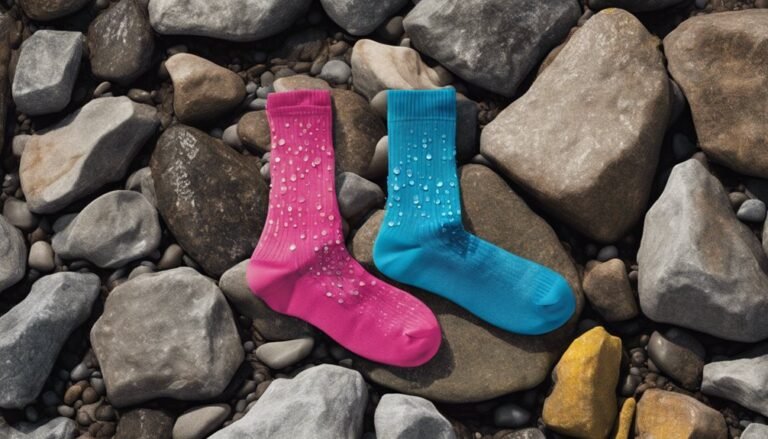Breathable Mesh Socks vs. Moisture-Wicking Socks: What Works Best in the Heat?
When it comes to heat, breathable mesh socks excel in enhancing airflow, keeping your feet cool during intense activities. However, moisture-wicking socks pull sweat away from your skin, promoting dryness and reducing risks like blisters. If you need cushioning and comfort for low-intensity activities, choose thicker socks. For high-intensity workouts, lighter, breathable options are ideal. The balance between breathability and moisture management is essential, and there's more to discover about optimizing your sock choice for specific activities.
Understanding Breathable Mesh Socks

When it comes to choosing the right socks for comfort and performance, understanding breathable mesh socks can make a significant difference. These socks feature breathable designs that enhance airflow, keeping your feet cool during intense activities. Unlike traditional socks, breathable mesh allows moisture to escape, reducing sweat accumulation and discomfort. This breathability not only guarantees a more pleasant experience but also contributes to sock longevity. By minimizing the damp environment that often leads to wear and tear, these socks can last longer, providing you with better value. When you prioritize breathable mesh socks, you're investing in comfort and performance, allowing your feet the freedom to move naturally while staying dry and fresh.
The Benefits of Moisture-Wicking Socks
While breathable mesh socks excel at promoting airflow, moisture-wicking socks take comfort to another level by actively managing sweat. These socks pull moisture away from your skin, keeping your feet dry and enhancing overall foot health. When feet stay dry, you reduce the risk of blisters and fungal infections, allowing you to enjoy your activities freely. The performance advantages are clear: with less moisture, you can focus on your game, hike, or run without distraction. Plus, moisture-wicking fabrics often provide added cushioning, further enhancing comfort. Whether you're hitting the trails or tackling your daily routine, choosing moisture-wicking socks can boost your performance and keep your feet feeling fresh, letting you embrace every moment with confidence.
Comparing Materials and Construction
The choice of materials and construction in socks greatly impacts their performance and comfort. When you're looking for socks that can handle heat, consider how different fabrics contribute to sock durability and temperature regulation. Breathable mesh often uses lightweight synthetic fibers, allowing air to circulate, while moisture-wicking socks typically incorporate hydrophobic materials that pull sweat away from your skin.
| Feature | Breathable Mesh Socks | Moisture-Wicking Socks |
|---|---|---|
| Material | Lightweight synthetics | Hydrophobic blends |
| Durability | Moderate | High |
| Temperature Regulation | Excellent airflow | Efficient moisture transfer |
Understanding these differences helps you make informed choices, ensuring you stay comfortable and free to move, even in the heat.
Breathability vs. Moisture Management
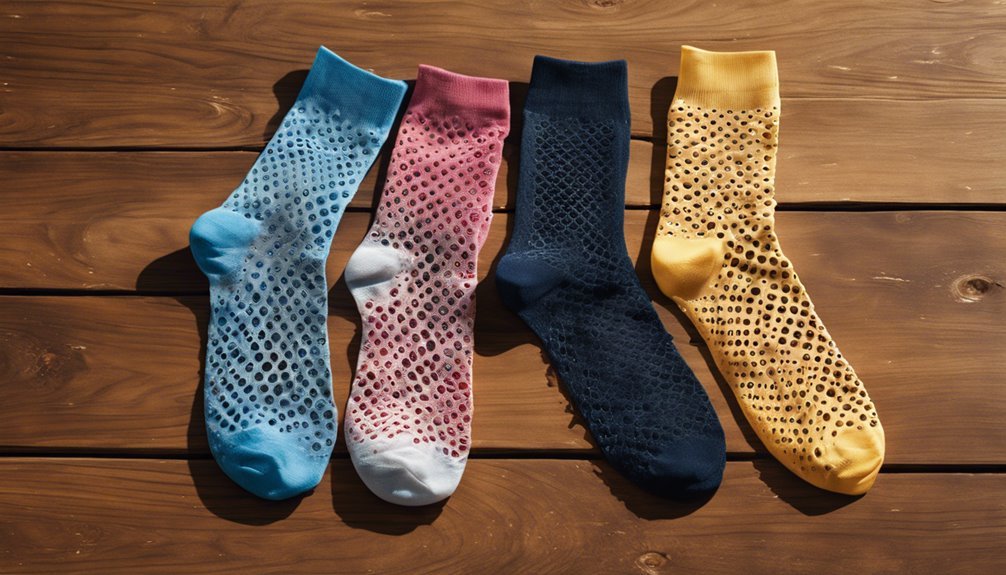
Understanding the difference between breathability and moisture management can greatly influence your sock choice, especially in warmer conditions. Breathability standards measure how well air circulates through a fabric, allowing heat to escape and keeping your feet cool. On the other hand, moisture management focuses on how effectively a sock pulls sweat away from your skin, reducing moisture retention. While breathable fabrics keep your feet feeling fresh, moisture-wicking socks actively transport sweat to the exterior, where it can evaporate. Choosing the right balance between these two factors is essential for comfort during hot weather. Ultimately, a sock that excels in both breathability and moisture management will enhance your freedom of movement, helping you stay light on your feet, no matter the activity.
Choosing the Right Sock for Your Activity
How do you choose the right sock for your activity? Start by considering the sock thickness. Thicker socks provide cushioning and are great for low-intensity activities like hiking, while thinner options offer breathability for high-intensity workouts, such as running or cycling. Next, evaluate your activity intensity; if you're pushing hard, moisture-wicking socks will keep your feet dry, preventing blisters and discomfort. For lighter activities, breathable mesh socks can keep your feet cool without sacrificing comfort. Also, think about the terrain and climate. In hot conditions, prioritize moisture management to enhance your performance. Ultimately, the right sock should complement your activity, allowing you to move freely and confidently, no matter what you're doing.
Frequently Asked Questions
Can I Wear Breathable Mesh Socks for Winter Activities?
While breathable mesh socks feel like a gentle breeze, they lack winter insulation for cold weather performance. You might want thicker, warmer socks to keep those toes cozy during your winter escapades. Enjoy the freedom!
Do Moisture-Wicking Socks Retain Odors More Than Breathable Mesh Socks?
Yes, moisture-wicking socks can retain odors more than breathable mesh socks due to their synthetic materials, which may trap bacteria. Choosing socks with antimicrobial properties can help minimize odor retention, enhancing your comfort and freedom during activities.
How Do I Properly Wash Breathable Mesh and Moisture-Wicking Socks?
To properly wash your socks, use gentle washing techniques like cold water and mild detergent. Air-dry them to maintain elasticity and breathability. Following these sock care tips keeps them fresh and prolongs their lifespan.
Are There Specific Brands Known for Quality Breathable Mesh or Moisture-Wicking Socks?
When considering brand comparisons, look at top recommendations like Smartwool for moisture-wicking and Wigwam for breathable mesh. They offer quality designs that enhance comfort, making your active pursuits feel more enjoyable and freeing.
Can I Use Breathable Mesh Socks for Running in the Rain?
You can use breathable mesh socks for running in the rain, but their rain performance may not be ideal. While they allow airflow, they might not keep your feet dry, so moisture-wicking options could be better.

